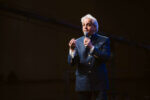One of the great joys of being a journalist overseas, if you are a Christian, is to take part in some unique worship services all over the world. For me, the Easter season that we recently celebrated has always provided the most dramatic and moving experiences.
I’ve stood trembling with cold atop the Great Wall of China for an Easter sunrise service. I’ve mingled with expectant, murmuring Russians late on Saturday night amid the candles in the Zagorsk Cathedral outside Moscow. I’ve sat in the soul-quietening stillness of Jerusalem’s Garden Tomb just after dawn before a communion service on Easter morning.
There is in the worship at Easter such a triumphant celebration of Christ’s victory over death, the world and the devil that even the most hateful anti-Christian regimes have had enormous trouble trying to keep the Christian joy down.
In the United States and much of the West, that celebratory joy sometimes has been harder to appreciate because of the raucous commercialization that accompanies it. Easter, at times, appears threatened with terminal trivialization by the ubiquitous Easter Bunny sentimentality and egg-rolling contests.
I say “at times” because there is one magnificent Christian tradition that emphatically resists this. It is called Lent.
Many evangelical and charismatic churches have traditionally been a little troubled by the concept of Lent. After all, it is part of the annual “calendar” of historical churches–Roman Catholic, Protestant and Orthodox–that have clung to the liturgy as their principal guide to worship–and that have often resisted evangelism and real moves of the Holy Spirit. For a time, America’s Puritan-influenced forebears would not observe the 40 days excluding Sundays that constitute Lent.
But whether you are entirely nondenominational or Episcopalian, as I am, Lent is a time to reflect soberly and humbly on your own spiritual condition, to make right your relationships with others, and to meditate about what the Lord went through before and during His crucifixion.
Traditionally, the Eastern Orthodox Church focuses the most intensely upon Lent. One service in particular seems to have no equivalent in Christendom.
This is the Rite of Forgiveness service. During it, every single church member must ask every other church member for forgiveness for any offense committed against him or her the previous year. I am told it is a time of wonderful healing and joy.
Roman Catholics and liturgical Protestant churches have emphasized Lent as a time to develop personal spiritual disciplines. Many Christians during Lent deny themselves routine pleasures like desserts, coffee or television.
But many Christians don’t just give things up, they take up something as part of the same spiritual discipline. It may be a commitment to pray daily for the persecuted church around the world (or to pray for their neighbors) or to regularly read some of the great Christian devotional classics.
Christians who are a little suspicious of church liturgies actually should welcome Lent rather than keep it at arms’ length. The Bible itself reminds us that there is a time to mourn and a time to dance (see Eccl. 3:4).
If you missed the opportunity this year to share in the sufferings of Christ, even in the small ways that Lent offers, then consider its benefits as you walk with Him through the rest of the year. The purpose of Lent has nothing to do with one’s positional relationship with God–which is established by grace through faith (see Eph. 2:8)–but everything to do with one’s spiritual self-control. It is a commitment not to be ruled by our bellies or dominated by our appetites.
And fasting from anything is almost always good from time to time. As Psalm 30:5 points out: “Weeping may endure for a night, but joy comes in the morning” (NKJV).
The spirit of Lent is that quiet time when we are reminded, with some sorrow, of how much Christ suffered to accomplish what He did on our behalf.








Leave a Comment
You must be logged in to post a comment.